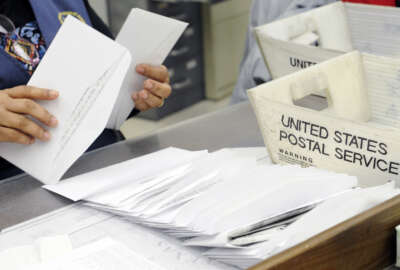
What USPS could learn from other nations’ rural post office financing
The USPS Office of Inspector General surveyed the postal services of six nations to see how they deal with rural networks.
Best listening experience is on Chrome, Firefox or Safari. Subscribe to Federal Drive’s daily audio interviews on Apple Podcasts or PodcastOne.
The U.S. Postal Service shares at least one thing with postal services throughout the world. The operation of a rural post offices is both important to the people they serve, but can be an economic to keep open. The USPS Office of Inspector General surveyed the postal services of six nations to see how they deal with rural networks. For what they found, Public Policy specialist Jacob Thomases joined Federal Drive with Tom Temin.
Interview transcript:
Tom Temin: Mr. Thomases, it’s good to have you on.
Jacob Thomases: Thanks, Tom. It’s great to be with you.
Tom Temin: And I wanted to ask you about something that you stated in the report about the universal service obligation that the Postal Service has and the other parallel postal services have. But in the United States, you found that the Postal Service, unlike most of its benchmark peers, does not have a USO that mandates a minimum number or density of retail outlets. So that means the Postal Service is not under constitutional or legal obligation to have any rural post offices in theory, correct?
Jacob Thomases: That’s right for your listeners who aren’t aware, the universal service obligation or USO is this set of rules that govern what posts may do. And pretty much every post around the world has its own us. So the U.S. Postal Service’s USO tends to be less well defined when it comes to the whole retail network – the network of post offices – than those in other countries. So while other countries dictate how many post offices a post must maintain, and how close those post offices must be to the people, the U.S.’ is does not do that. It does require the U.S. Postal Service to maintain a maximum degree of effective Postal Service to rural areas, but it doesn’t say how they must do that.
Tom Temin: And the other observation is that the Postal Service has the right, I guess, under the laws that govern it, to apply for several hundred million dollars in rural funding from Congress. But the postal service does not do that. Tell us more about that observation.
Jacob Thomases: That’s right. So when the Postal Service became largely self-funded, in 1970, the law was written that allowed them to request funds from Congress to maintain their retail network, not just in rural areas, but all over the country. Those amounts changed over time. But right now the law says that they can request $460 million annually from Congress for this purpose. They have not done so since fiscal 1982. And they say – we asked them about that, why they have chosen not to request that money. And they give a few reasons among them that they’re not sure that they would actually get the money even if they requested it, and that they are looking for a more long-term legislative solution that would allow them to be sustainable, rather than kind of these one-time, possible annual payments.
Tom Temin: So basically, then, they take the loss on operation of rural retail post offices.
Jacob Thomases: That’s right. And we don’t know exactly what kind of loss they’re doing. This is a tricky area because as we point out in the paper, the definition of rural is really mushy. And it changes from country to country. So it’s difficult to do cross country comparisons. But even within the U.S., the Postal Service has no set definition of a rural post office or a city post office or suburban post office. So it’s one of those things that you kind of have to know when you see it. So when we spoke to them, and when we did this research, a lot of it was sort of common sense and anecdotal versions, but it’s hard to categorize. You know, what is a rural post offices, how much money are those post offices potentially losing? Are some of them losing money, but not all of them? They tend to be less profitable because they simply serve less people. So they’re bringing in less revenue and yet they have all these fixed costs. You have to pay people to staff them, you have to pay a lease on them, you have to pay to keep the lights on etc.
Tom Temin: We’re speaking with Jacob Thomases. He’s a public policy specialist in the Office of Inspector General at the Postal Service. Alright, so you looked at several nations to see how they deal with their rural networks. What countries and what did you find?
Jacob Thomases: We looked at six different countries and that was the United Kingdom, France and Germany, and Sweden in Europe, and then Canada and Australia. And we found that they share this common problem of the rural post offices that they are all obligated to maintain some rural presence, that it can have profitability challenges, but they’re also facing – those areas are often facing declining populations, declining letter mail volume, which hurts their revenue. And so they’re they’re taking a lot of different approaches to solving these problems, some of which we believe could potentially be applied to the U.S. Postal Service.
Tom Temin: And what are some of the solutions that they do do?
Jacob Thomases: So I would say they fall into three main buckets. Number one is cost cutting, and that could look like something like outsourcing. So a lot of these posts outsource heavily, especially in rural areas. They will have other partners, often private retail partners operate their posts for them. And when I say that, I should say they offer postal functions within the retail units of these other stores. So you could have a bookstore that sells stamps and other postal products. And then the post just pays that retail store a fee to provide these services. So that’s one form of cost cutting. Another is raising new forms of revenue. So these posts say, “Well, hey, we are obligated to maintain post offices in these areas. These areas are underserved by a lot of other stores. How can we sell other things to them, since we have to maintain this, this physical presence?” And so it might be things like financial services, a lot of them offer banking services to these areas that are underbanked. And then finally, the third bucket, I would say is just direct subsidy from the government and in particular, that’s the UK and France believe that the post has a public service mission in these more remote areas. And so they simply pay these entities that – the British post and the French post – to maintain this large network of physical post offices.
Tom Temin: And correct me if I’m wrong, but I’m pretty sure the Postal Service here experimented a few years back with putting services in retail establishments, like some of the large big box stores, I think, whatever happened with that trial?
Jacob Thomases: That’s right. They have tried some outsourcing. They had a partnership, in particular with Staples to offer a suite of services there, but that ended pretty badly. One of the postal unions protested that this was in violation of their contract. They took it to the National Labor Relations Board, and the NLRB agreed that this was a violation and so the Postal Service pulled out of the agreement entirely and you’ll no longer find Staple stores offering any kind of postal services.
Tom Temin: So if that’s the case, then, or that’s the precedent, it seems like that first option then to provide retail partners doesn’t really seem like an option at this point.
Jacob Thomases: There could be other ways to do it, the postal service does still have about 10% of its total units are outsourced. Now, that may seem like a fair amount, but it’s still far, far less than these other posts that we studied. Germany, for example, outsources 100% of their post offices. They do not operate a single post office in Germany. The UK is not far behind, and the other is kind of trail there. So we believe that there is more room to expand those programs. They could also partner with other entities such as other government agencies. So if you have a remote or rural area that is underserved in lots of different ways, they might not have access to other government services as well. So potentially the Postal Service could partner with a different agency to set up a single office that would offer services on behalf of these different government agencies, and you could achieve more efficiency that way.
Tom Temin: Almost like mini rural federal buildings?
Jacob Thomases: Exactly.
Tom Temin: And then, of course, direct subsidy and who knows what kind of appetite there is for Congress there. What did you recommend if anything?
Jacob Thomases: We didn’t have any formal recommendations in this report. In the research group that I’m a part of, we sometimes have formal recommendations, and sometimes it’s more informational. This was one of the latter. We believe that these other contexts are unique. And we don’t necessarily want to tell the Postal Service that they have to follow the model set in Germany or Canada or Australia, because the context could be so different. So we wanted to present these ideas to them and to the postal community at large to say, “Hey, these other posts are having the same kind of problem. Here’s how they’ve chosen to tackle it.” Some of these approaches may be more or less effective. It’s worth noting these and seeing whether they could be applied to the US context. So there are some things that we suggest such as outsourcing that we were just talking about- they could look into doing this more, but we didn’t want to recommend or tell them specifically, they must outsource.
Tom Temin: And then of course, there are some places where there’s not much left in tiny towns. It seems like the postal service itself maybe could do those other forms of revenue. They could sell cappuccino or gift cards, or, I don’t know, jewelry.
Jacob Thomases: Potentially, yeah, they do have some additional forms of revenue. They don’t bring in much money, but you’ll be able to buy greeting cards, for example, at a post office. You can get a money order now at a post office. Many of them you can process your passport application. Again, the amount of revenue they bring in is pretty small, but the services they provide really have a social value. And this is one of the points that we wanted to make in this paper is that while rural post offices may be financially troubled, they do have this social value that goes beyond dollars and cents for these rural communities that maybe have lost their their local stores. They don’t have a lot left, the post office could be, you know, one of the last kind of bastions of connectivity that they have to the rest of the country. And certainly Congress has placed a lot of value in this. And we believe that the Postal Service also feels that they have a special role to play in these small American towns.
Tom Temin: Maybe they could put back the pot bellied stoves and a couple of straw chairs?
Jacob Thomases: That’s possible.
Tom Temin: Jacob Thomases is public policy specialist in the Office of Inspector General at the Postal Service. Thanks so much for joining me.
Jacob Thomases: Thank you.
Tom Temin: We’ll post this interview along with a link to his report at www.federalnewsnetwork.com/FederalDrive. Keep the federal drive coming to your inbox. Subscribe at Apple Podcasts or Podcastone. Stay up to date on your agency’s latest responses to coronavirus. Visit our special resource page at www.federalnewsnetwork.com
Copyright © 2024 Federal News Network. All rights reserved. This website is not intended for users located within the European Economic Area.
Tom Temin is host of the Federal Drive and has been providing insight on federal technology and management issues for more than 30 years.
Follow @tteminWFED
Related Stories

Post-impeachment Congress faces Postal Service bill and more




